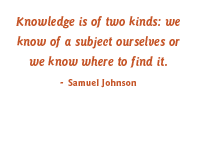| People |
| Philosophy |

 |
|
|
|
 |
<< GO BACK A Culture of Learning
Download/Print:
Today's knowledge workers are a lot different from workers of past generations. Well-educated, highly-experienced specialists often coming out of big corporate environments, these are not really employees in the traditional sense. Just as a company's capital may be held in buildings, equipment, inventories, brands, and proprietary processes, a knowledge worker's capital — their intellectual property — is held inside their heads. They may have decided to rent their brains to you for the time being, but the minute the job loses its luster, they will pack up their property and head off to greener pastures, perhaps even to a competitor. So what keeps good employees engaged? Appropriate compensation and benefits are important, of course, but after a while the latest increase in compensation simply becomes the base. Work/life balance has also become a key issue for employees, many of whom have spent significant portions of their careers working long hours or in constant travel, and successful companies are finding ways to create flexible work routines. But almost every high-achieving professional I've ever talked to on the subject has told me that what they're really looking for is a chance to make a difference. A sense of achievement is important to people — top performers want to work in functional, well-run companies where they have the opportunity to experience professional success and growth. The lack of those opportunities can make someone leave a financially rewarding job, while the presence of those opportunities can tie a valuable employee to your organization for years — through good times and bad. Creating this environment in your organization is not simply an HR issue that can be achieved with a cookie-cutter training program; it's a matter of defining and developing your culture so that it's obvious — both internally and externally — that your organization is one that celebrates personal and professional achievement, and values and promotes people who take personal responsibility to learn and grow everyday. Where can you start? If you really want to have a learning organization, begin by making sure you have the right people on the bus. That means that people in your organization are not only good at the technical aspects of their jobs, but that they also fit the firm's culture. There are plenty of times we turn a blind eye to poor cultural fit because we've hired someone who's extremely productive or, alternatively, we have a staff member who is not very productive but "everyone likes them". The following matrix shows where some additional consciousness-raising or action may be required.
Once you've got the right people, and they're all working in the same direction, let them know what your expectations are for their success, and what resources you will make available to them to manage their own growth and development. Then, if you've laid the appropriate groundwork, get out of their way. Successful leaders know that their job is not so much to motivate people, but rather to focus all their efforts to make sure that they're not de-motivating anyone. |
||
 |
 |
 |